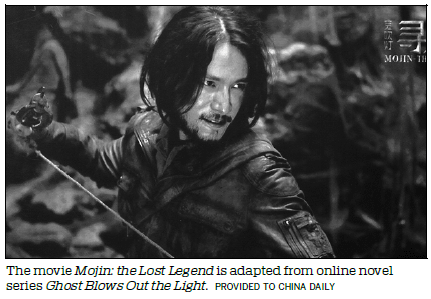Agreement reached in long-running novel character dispute
A long-running copyright lawsuit centering around a new work by an author using characters from a novel whose copyright he had sold has recently come to an end, after both parties withdrew their appeals and accepted the original verdict.
In 2015, Shanghai Xuanting Entertainment Information Technology filed a complaint against Zhang Muye, who wrote an online novel series entitled Ghost Blows Out the Light under his pen name Tianxia Bachang, as well as relevant publishers, with the People's Court of Pudong New Area in Shanghai.
Zhang signed an agreement to transfer the property rights to the copyright of Ghost Blows Out the Light to Xuanting in 2007.
The Shanghai-based company claimed that Zhang reused major characters that he created but no longer owned the rights to in the story Mojin Xiaowei, infringing the copyright of the original work.
Later, Xuanting authorized the copyright to Wanda Pictures, the film arm of Dalian Wanda Group, to make the adapted film Mojin: the Lost Legend.
Zhang told the media that he only granted the copyright to the first and second novels of the series to Xuanting and he still has the rights to use the original characters in his new creations - it is his "freedom of creation", according to IPRdaily.
Although the novels Ghost Blows Out the Light and Mojin Xiaowei share the same characters, they tell different stories, he said.
The court found that although the new novel adopted the same characters, it is not an extension of the original story, but rather, has a different plot.
As the creator of the characters, the author has the right to use them in his later works, unless stipulated otherwise, according to the court.
On the other hand, the judges said the publishers took advantage of the fame of the movie Mojin: the Lost Legend, misleading the public about the links between the movie and the novel. That would lead to substantial damage to the plaintiff and constitute false promotion.
The court said although the use of the cover of the novel in question was authorized by third party Wanda Pictures, the defendant should still obey basic market competition rules when using authorized pictures, and the way of using them should not infringe on the legitimate rights and interests of others.
Wang Yun, attorney at Beijing JJ&G Law Firm, told China Intellectual Property News that the difference between this case and others is that the new story was written by the same author.
This type of creation is a natural right and it is different from property rights, which will neither be limited due to the transfer of copyright license nor will constitute unfair competition, Wang said.
Du Lingyan, the presiding judge in the case, said the case is the first of its kind in China.
"The court decision has clearly set the industry norms that should be followed in the use of original characters and other elements for creation of new works.
"It is necessary to fully respect the legitimate rights and interests of the original works, to guarantee the freedom of creation and comment and thus to promote cultural dissemination and prosperity," Du said.
liangkaiyan@chinadaily.com.cn

(China Daily 10/10/2019 page17)














